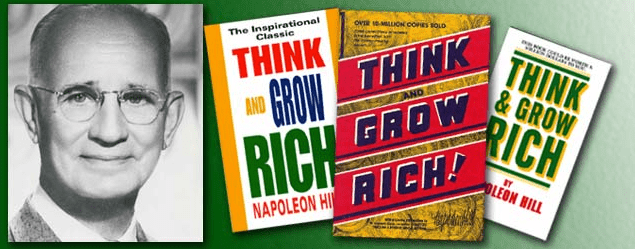Due to some recent work on a project, I went back and revisited an old friend. Well, sort of. I’ve never met this man whom I call friend. However, he did inspire me and guide me during my early years, so that qualifies him as an old friend. His name is Napoleon Hill.
 You may know him, as well. As a matter of fact, if you do know him, I’ll bet you smiled upon reading his name. His writing and audio tapes inspired many. While Think and Grow Rich was published in 1937, I did not read it until the late 70’s. The title implies a primarily money focused approach to living life. The fact the multi-millionaire Andrew Carnegie wrote the introduction further suggests this book is primarily about creating financial wealth. Once inside its pages though, you discover that Napoleon Hill was a brilliant evangelist for living life from the heart and using ones mind to positively set the trajectory for every choice you make day to day.
You may know him, as well. As a matter of fact, if you do know him, I’ll bet you smiled upon reading his name. His writing and audio tapes inspired many. While Think and Grow Rich was published in 1937, I did not read it until the late 70’s. The title implies a primarily money focused approach to living life. The fact the multi-millionaire Andrew Carnegie wrote the introduction further suggests this book is primarily about creating financial wealth. Once inside its pages though, you discover that Napoleon Hill was a brilliant evangelist for living life from the heart and using ones mind to positively set the trajectory for every choice you make day to day.
Here’s the intriguing part, Napoleon Hill intuitively knew what neuroscience is proving today. What we focus on is what we get. Where we put our attention changes what we see and experience. I re-read his 17 Principles and was struck by how many of them endorsed the current principles of neuroplasticity.
Neuroplasticity is the official term for how we can keep growing our brain by changing the connections and neural pathways. To learn more, click here, here (for a short description), or here (for a longer description.)
Focus is a key element. I decided it might be fun to look at his principles again for myself and make the connections between the Principles and the research I have been enjoying learning from during the past two years. Feel free to join me on this short journey into purposefully bringing ‘old teachings’ into a new context.
Next up: Principle 1: Definiteness of Purpose. (For a look at the scroll with the Principle, go to and print your own page to use as inspiration.)
Concise post 🙂
We are just a the tip of the iceberg when it comes to the areas of research such as quantum mechanics and neuscience. I think that the more we find out about subjects like these, the more we will realize what a key part consciousness plays in this.
His analogy of how the brain is like a radiostation and thoughts of similar vibrations attract each other etc. is really interesting as well. Even though he was a bit off with his conviction of “the ether”.